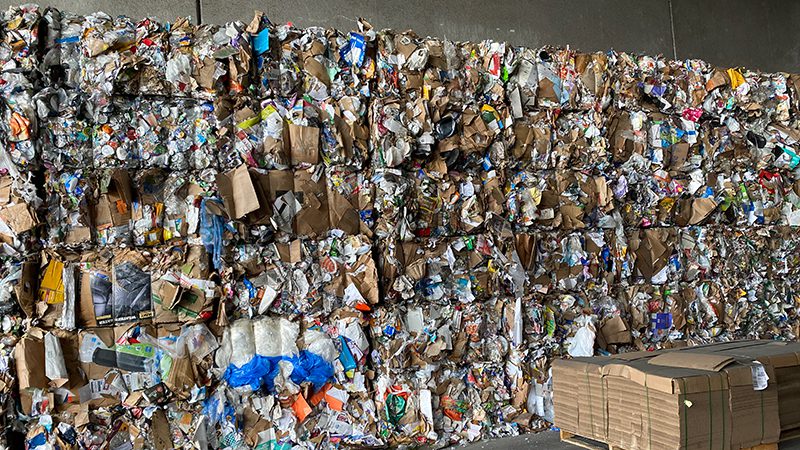The double mission of Seadrunar Recycling
This article was originally published in April 2024

Most recycling businesses start with a mission. Seadrunar Recycling has two.
The South Seattle facility, which sorts, bales and recycles cardboard from all PCC stores (and other items from selected stores), is of course designed to keep materials out of landfills. Its 42,000-square-foot facility is also able to process some products that larger municipal services can’t, including services like paper shredding.
It’s a non-profit organization, though, and its other goal is supporting Key Recovery, a long-term drug and alcohol rehabilitation center located nearby. Seadrunar Recycling was actually founded in 1979 for that purpose (the name comes from its original incarnation as Seattle Drug and Narcotic Center). The recycling business now almost entirely funds the treatment center, said Director of Operations Aren Oleson, and it provides a hands-on job training program. People in recovery at the residential program, many of whom “haven’t had much opportunity in life,” learn to drive forklifts, operate recycling lines, weld and work toward commercial driver’s licenses.
“We are not only saving the world by recycling, we’re saving lives,” Oleson said.
On a recent Seadrunar tour, Oleson showed PCC staff around the Manufacturing Recycling Facility (MRF), a tightly organized space filled with stacks of compressed and baled cardboard, high heaps of aluminum and paper and plastics, and a roller-coaster like system of conveyer belts and sorting machinery that moves some 30,000 tons of material per year. Also joining the tour was Erika Frayser of Seattle-Tacoma Box Co. (see their story here), working with Erik Lind, PCC’s Operations, Programs, and Projects manager, on recycling her company’s produce boxes.
The corrugated plastic produce boxes created by Seattle Box are a rare recyclable version of those produce boxes – but the materials they’re made of can’t be processed by many municipal systems. Produce workers in PCC stores sounded an alarm that the boxes were being sent to the landfill instead. “The recyclers wouldn’t pick them up, they would consider them contamination to the recycling load,” Lind said.
Now, instead, PCC will flatten the produce boxes it receives from farmers for Seadrunar pickups. Seadruner is currently picking up boxes from nine PCC stores (with Seattle Box Co. handling the rest) and hopes to serve all 15 stores by year’s end. Seadrunar will sell the boxes back to Seattle Box Co., which will use them for new recycled produce boxes and keep the cycle going.
Most recyclers focus on material that is easy to handle and makes the largest profits, Lind said. “They don’t want to take the challenging stuff.”
Guiding visitors through the facility, “This is where our trucks come in,” Oleson explained as employees and equipment processed piles of mixed materials. Workers pulled out any “major contamination” that would clog the equipment, while blowers and belts running at different speeds and screening devices that separate the different materials, sending metals to one area, paper to another, and so on.
While automation is essential, “we have a lot of people learning general job skills,” so there are more humans in the inspection and sorting process than most have. About 80% of products are separated mechanically, he said, while 20% is done by hand.
That said, the company is investing in new optical screeners that will help speed up the sorting.
“We are a training facility. We want to keep the labor positions open for people that want jobs,” he said. But optical screeners are virtually required now for quality and volume.
Other new equipment is designed to combat the “Amazon effect” where Amazon packaging is confounding older screening tools and getting sorted into mixed paper categories that then sell for a lower price.
Lind was originally looking for a less expensive option for cardboard recycling when he connected with Seadrunar, then found other benefits – transparency, data, the ability to track where pickups are processed and more. “How can we not partner with someone who’s zero waste, who’s a non-profit – I can keep checking boxes?” he said.
Oleson said graduation from the program for trainees “is not just a certificate, congratulations, good luck. It’s “You have a full-time job, money saved, clean and sober housing set up and a job.” He found that personally, he said, after graduating from the program in 2016.
“Now I get to tow people behind me,” he said. “It’s a beautiful thing.”
